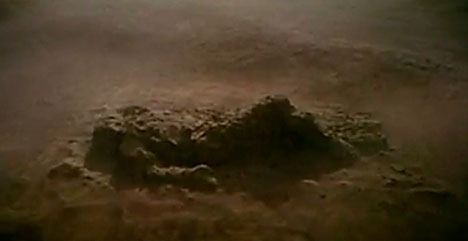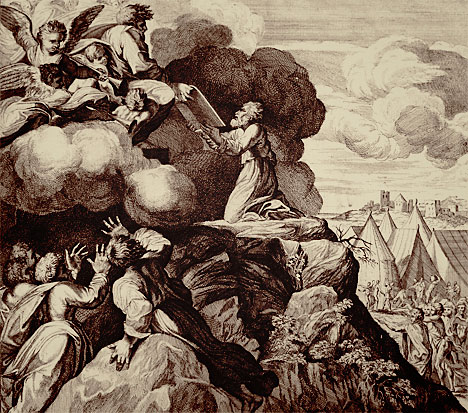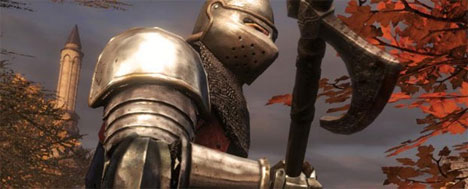Oct
7
2013

“The Spirit consistently puts earthly Succession to death, dividing families, communities and entire countries, as we see today. To claim otherwise is to work against the Spirit in the world. My heredity, my household, my culture, is the target of my ministry, not its source.”
It’s time to get back into Galatians. To recap, the epistle follows the Covenant structure, but gives the central point, the Ethics, its own Covenant structure. If this thesis is correct, what we should expect in the next “cycle” (Gal. 3:26-4:7) is a discussion of Covenant Succession. Lo and behold, this is exactly what we find.
Continue reading
2 comments | tags: Abraham, Baptism, Circumcision, Covenant Theology, Ezra, Galatians, Genesis, Isaac, Leviticus, Moses | posted in Bible Matrix, Biblical Theology
Oct
1
2013

There are heavenly bodies and earthly bodies,
but the glory of the heavenly is of one kind,
and the glory of the earthly is of another.
(1 Corinthians 15:40)
Did Adam receive the Spirit of God? If he did receive the Spirit, was the Spirit taken away when he sinned?
This post has been slain and resurrected for inclusion in my 2015 book of essays, Inquietude.
Continue reading
Comments Off | tags: AD70, Baptism, Covenant Theology, Feasts, Genesis, Tabernacle, Tabernacle of David | posted in Against Hyperpreterism, Bible Matrix, Biblical Theology, Creation
Sep
24
2013

In John 16:7-11, we read:
Nevertheless, I tell you the truth: it is to your advantage that I go away, for if I do not go away, the Helper will not come to you. But if I go, I will send him to you. And when he comes, he will convict the world concerning sin and righteousness and judgment: concerning sin, because they do not believe in me; concerning righteousness, because I go to the Father, and you will see me no longer; concerning judgment, because the ruler of this world is judged.
What does it mean for the Spirit to “convict the world in regard to righteousness?” And what is the causal connection with Jesus going to the Father?
Continue reading
Comments Off | tags: Covenant Theology, Exodus, Firstfruits, Fractals, Genesis, Jacob, John, Literary Structure, Moses, Revelation | posted in Bible Matrix, Biblical Theology, Creation, Q&A, The Last Days
Sep
8
2013

“Whoever sheds the blood of man,
by man shall his blood be shed,
for God made man in his own image.”
(Genesis 9:6)
James Jordan’s contribution to the study of any particular book of the Bible is invaluable, but the most important is very likely his work on Genesis. Because spineless modern theologians are unwilling to stand for its complete veracity, and yet very willing to jettison basic logic, they often miss the significance of its early chapters for the rest of the Bible and of history.
Continue reading
Comments Off | tags: cherubim, Genesis, James Jordan, Noah, Psalms, Seraphim | posted in Bible Matrix, Biblical Theology, Ethics, The Last Days
Jul
16
2013
 “When Moses slew the Egyptian, he was doing the will of God but not with the power of God.”
“When Moses slew the Egyptian, he was doing the will of God but not with the power of God.”
Numbers 12:3 says that Moses was the meekest man “on the face of the ground [adamah].”
Psalm 37:11 says the meek will inherit the Land [eretz] and delight in abundant prosperity.
Isaiah 11:4 says that
with righteousness [God] shall judge the poor,
and decide with equity for the meek of the Land;
and he shall strike the Land with the rod of his mouth,
and with the breath of his lips she shall kill the wicked.
Firstly, what is meekness? And secondly, why is it connected to “face of the ground” (Adam), or Land?
This post has been slain and resurrected for inclusion in my 2015 book of essays, Inquietude.
Continue reading
Comments Off | tags: Ascension, Firstfruits, Genesis, Herod, Isaiah, James Jordan, Matthew, Moses, Pharaoh, Tabernacle | posted in Bible Matrix, Biblical Theology, Christian Life, Ethics, Quotes, The Last Days
Jul
9
2013

And he was teaching them and saying to them, “Is it not written, ‘My house shall be called a house of prayer for all the nations’? But you have made it a den of robbers.” (Mark 11:17)
The same word is used of the men crucified alongside Jesus in Mark 15:27.
And with him they crucified two robbers, one on his right and one on his left.
Is this merely coincidental, or is there something deeper going on? Is there a link between the “white collar” Temple crimes and the “blue collar” criminals?
Continue reading
3 comments | tags: Atonement, Crucifixion, Genesis, Mark, Temple, Ten Commandments | posted in Bible Matrix, Biblical Theology
Jun
20
2013
 The intro to the Reading the Bible in 3D seminar mentions the “jokes” in the Bible. In his book Deep Exegesis, Peter Leithart gives us a rundown on what a joke is to justify using the word to describe some of the allusions in Scripture. One of the reasons jokes are funny is their reliance on inside information.
The intro to the Reading the Bible in 3D seminar mentions the “jokes” in the Bible. In his book Deep Exegesis, Peter Leithart gives us a rundown on what a joke is to justify using the word to describe some of the allusions in Scripture. One of the reasons jokes are funny is their reliance on inside information.
Here’s my all-time favourite joke in the Bible.
Continue reading
Comments Off | tags: Covenant Theology, Daniel, Esther, Genesis, James Jordan, Joseph, Mordecai, Peter Leithart, Revelation, Typology | posted in Bible Matrix, Biblical Theology, Reading the Bible in 3D
Jun
4
2013
or Bird’s Eye View
[This post has been refined and included in Sweet Counsel: Essays to Brighten the Eyes.]
Continue reading
2 comments | tags: Genesis, Herod, Noah, Revelation, Systematic typology, Urim and Thummim | posted in Bible Matrix, Biblical Theology, The Last Days
May
30
2013

or The Murderess of Modernity
Joe Rigney has a great piece on the Trinity House website. With apologies to Joe, I’ll give it to you in a nutshell, then make some brief observations. But make sure you read the entire article.
Continue reading
11 comments | tags: Compromise, Culture, Esther, Genesis, Joe Rigney, Martyrdom, Mordecai, Peter Leithart | posted in Christian Life, Creation, Ethics, Quotes
May
15
2013

“He said to him, ‘Bring me a heifer three years old, a female goat three years old, a ram three years old, a turtledove, and a young pigeon.’ And he brought him all these, cut them in half, and laid each half over against the other. But he did not cut the birds in half. And when birds of prey came down on the carcasses, Abram drove them away.” (Genesis 15:9-11)
When Abram asked for a sign concerning the Lord’s promise concerning an heir, the Lord carried it out with animals slain and displayed upon the Land. In the Covenant-literary structure of Genesis 15, the animals were slain and laid out at “Pass-over,” and the Lord’s chariot (as a Head and Body) “passed-through” at Atonement, (matching Pass-over” chiastically) picturing Joshua and Israel entering Canaan. (See Pass-over and Pass-through, and compare the charts on pages 93 and 115 of Bible Matrix.)
What is also interesting is the “architecture” of the sacrifice. We do not know which animals were considered “clean” by the Lord in Noah’s time, but the number of sacrificial animals was now limited to five. They correspond to the architecture of the Tabernacle. If we include Abram in his deep sleep (as a “covering”) and the birds of prey representing the curse of the Law, in the following diagram we have the complete “footprint” of the humaniform house made entirely out of birds and beasts.
Continue reading
Comments Off | tags: Abraham, Circumcision, Genesis, Literary Structure, Tabernacle | posted in Bible Matrix, Biblical Theology


































